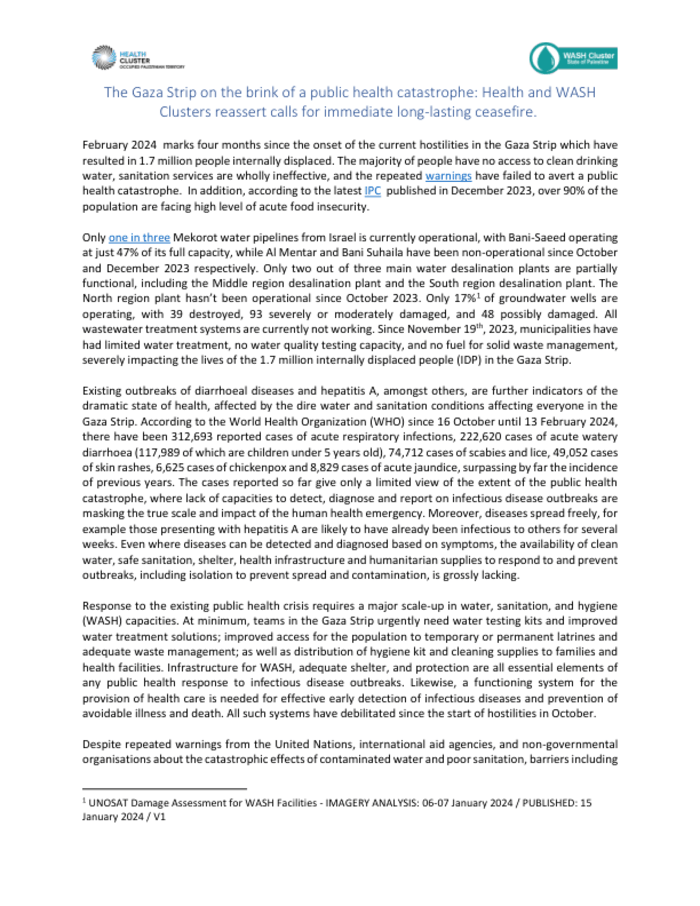
February 2024 marks four months since the onset of the current hostilities in the Gaza Strip which have resulted in 1.7 million people internally displaced. The majority of people have no access to clean drinking water, sanitation services are wholly ineffective, and the repeated warnings have failed to avert a public health catastrophe. In addition, according to the latest IPC published in December 2023, over 90% of the population are facing high level of acute food insecurity.
Only one in three Mekorot water pipelines from Israel is currently operational, with Bani-Saeed operating at just 47% of its full capacity, while Al Mentar and Bani Suhaila have been non-operational since October and December 2023 respectively. Only two out of three main water desalination plants are partially functional, including the Middle region desalination plant and the South region desalination plant. The North region plant hasn’t been operational since October 2023. Only 17% of groundwater wells are operating, with 39 destroyed, 93 severely or moderately damaged, and 48 possibly damaged. All wastewater treatment systems are currently not working. Since November 19th, 2023, municipalities have had limited water treatment, no water quality testing capacity, and no fuel for solid waste management, severely impacting the lives of the 1.7 million internally displaced people (IDP) in the Gaza Strip.
Existing outbreaks of diarrhoeal diseases and hepatitis A, amongst others, are further indicators of the dramatic state of health, affected by the dire water and sanitation conditions affecting everyone in the Gaza Strip. According to the World Health Organization (WHO) since 16 October until 13 February 2024, there have been 312,693 reported cases of acute respiratory infections, 222,620 cases of acute watery diarrhoea (117,989 of which are children under 5 years old), 74,712 cases of scabies and lice, 49,052 cases of skin rashes, 6,625 cases of chickenpox and 8,829 cases of acute jaundice, surpassing by far the incidence of previous years. The cases reported so far give only a limited view of the extent of the public health catastrophe, where lack of capacities to detect, diagnose and report on infectious disease outbreaks are masking the true scale and impact of the human health emergency. Moreover, diseases spread freely, for example those presenting with hepatitis A are likely to have already been infectious to others for several weeks. Even where diseases can be detected and diagnosed based on symptoms, the availability of clean water, safe sanitation, shelter, health infrastructure and humanitarian supplies to respond to and prevent outbreaks, including isolation to prevent spread and contamination, is grossly lacking.
Response to the existing public health crisis requires a major scale-up in water, sanitation, and hygiene (WASH) capacities. At minimum, teams in the Gaza Strip urgently need water testing kits and improved water treatment solutions; improved access for the population to temporary or permanent latrines and adequate waste management; as well as distribution of hygiene kit and cleaning supplies to families and health facilities. Infrastructure for WASH, adequate shelter, and protection are all essential elements of any public health response to infectious disease outbreaks. Likewise, a functioning system for the provision of health care is needed for effective early detection of infectious diseases and prevention of avoidable illness and death. All such systems have debilitated since the start of hostilities in October.
Despite repeated warnings from the United Nations, international aid agencies, and non-governmental organisations about the catastrophic effects of contaminated water and poor sanitation, barriers including restrictions of movement, lack of safety, and import constraints have persisted, leading to critical challenges in the humanitarian response. Access to water and sanitation are internationally recognised human rights, derived from the right to an adequate standard of living under Article 11(1) of the International Covenant on Economic, Social, and Cultural Rights and fundamental to the health, dignity, and prosperity of all people. Overall, these rights can only be realized with an immediate ceasefire and a massive increase in aid entering the Gaza Strip.
Urgent action involving multiple stakeholders and partners at all levels is needed to prevent the ongoing public health catastrophe from worsening.
Call for Action: measures immediately needed to stop the worsening of an already existing public health catastrophe in the Gaza Strip:
-
An immediate and sustained ceasefire. Integral to any effective Health and WASH response is the cessation of hostilities that allows for safe and unobstructed access to populations in need, particularly in the north of Gaza where access to water, waste-water facilities, hospitals, and health centres is close to non-existent.
-
Safe, unimpeded, and at-scale humanitarian access across and within the Gaza Strip, including in the North, ensuring that essential non-food items needed for an effective Health and WASH response enter immediately and unimpeded.
-
Ensure free and safe movement of medical and humanitarian personnel into and within the Gaza Strip. Ensuring safe access, unobstructed communication, and adequate coordination of activities is essential to an effective response. This includes free and safe movement of WASH technical staff for the operational and maintenance of critical water and sanitation facilities and services.
-
Immediately turn to full capacity the Mekorot water pipeline into northern Gaza, which is currently partially operational and has the potential to immediately improve access to safe drinking water. Allow safe access to repair Bani Suhaela Mekorote line in South region and Bani Sae’ed in the Middle region, including safe access for technical assessments and material supplies for repair work.
-
Allow entry to the temporary latrine / shower facility related construction items for IDPs.
-
Allow for sufficient fuel for the operation of critical water and sanitation infrastructure, including desalination plants and water wells, particularly in restricted areas such as the northern Gaza where fuel has not been allowed to enter since the temporary truce in November 2023.
